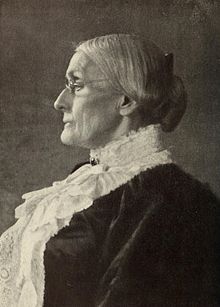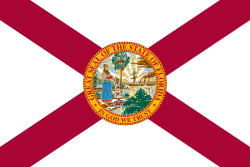Susan B. Anthony Day
| Susan B. Anthony Day | |
|---|---|
 Susan B. Anthony | |
| Observed by | (1) United States Florida legal holiday, state offices open (2) United States California and Wisconsin educational observance, schools open with related instructions (3) United States Massachusetts Local observance on August 26 (4) United States West Virginia state holiday on Election Day (Tuesday following 2nd Monday in November) |
| Type | Florida legal holiday California and Wisconsin educational observances Massachusetts local observance West Virginia state holiday |
| Date | February 15 |
| Next time | February 15, 2022 |
| Frequency | annual |
Susan B. Anthony Day is a commemorative holiday to celebrate the birth of Susan B. Anthony and women's suffrage in the United States. The holiday is February 15—Anthony's birthday.[1]
History[]
The idea of honoring Susan B. Anthony with a holiday has only been around since 2011 when Representative Carolyn Maloney introduced the Susan B. Anthony Birthday Act, H.R.#655.[2] Today, only the U.S. state of Florida has the holiday enacted with state offices closed. In the state of Wisconsin, Susan B. Anthony Day is also an established state holiday, enacted into law April 15, 1976, from the 1975 Laws of Wisconsin, Chapter 307, section 20.[3][4] In West Virginia, this day is celebrated on Election Day on even years.[5] This holiday is not celebrated at a national level. In 1985, The Seattle Times reported on a campaign to establish the holiday as one celebrated nationally.[6] (Other holidays that are not commemorated on an official federal level in the U.S. but widely observed are St. Patrick's Day and Arbor Day.) [7] The U.S. state of California has also made this day a legal holiday as of 2014.[8] In 2004, New York governor George Pataki signed legislation that made this a holiday in that state.[9]
On February 11, 2011, Representative Carolyn Maloney of New York introduced the "Susan B. Anthony Birthday Act" (H.R. #655) to the 112th session of Congress to honor the birthday as a U.S. national holiday on the third Monday of February.[10][11] The bill was not enacted and its current status is "dead".[12]
Observances by state[]
| State | Current local observances |
|---|---|
| California | Declared a holiday for schools to honor in community services on February 15. Schools remain open.[13] |
| Florida | Legislated as a legal holiday on February 15. Observances moved if day falls on a weekend.[14] |
| New York | Holiday is observed on February 15.[15] |
| West Virginia | Holiday is observed on Election Day[16] |
| Wisconsin | Holiday is listed as an observance on February 15.[17] |
| Massachusetts | MGL chapter 6, section 15E / Susan B. Anthony Day is celebrated on the 26th of August.[18] |
Origins[]

Susan B. Anthony is known for her leadership in the long campaign for women's right to vote in the United States and also abroad. She indicated her interest as early as 1852, when she attended the National Women's Rights Convention in Syracuse, New York. She was also a vigorous opponent of slavery. In 1863, during the American Civil War, she and Elizabeth Cady Stanton organized the Women's Loyal National League, the first national women's political organization in the U.S.[19] It collected nearly 400,000 signatures on petitions to abolish slavery in the largest petition drive in the nation's history up to that time.[20]

By the end of the Civil War, according to historian Ann D. Gordon, "Susan B. Anthony occupied new social and political territory. She was emerging on the national scene as a female leader, something new in American history, and she did so as a single woman in a culture that perceived the spinster as anomalous and unguarded ... By the 1880s, she was among the senior political figures in the United States."[21]
After the Civil War, Anthony worked primarily for women's suffrage, the legal right of women to vote. This right was established over the course of several decades, first in various states and localities, sometimes on a limited basis. It was established nationally in 1920 with the passage of the Nineteenth Amendment to the United States Constitution, which had been introduced in Congress in 1878 by Senator Aaron A. Sargent, a friend of Anthony's. The amendment was popularly known as the Susan B. Anthony Amendment in recognition of her leadership in achieving its passage.[22] She died in 1906, fourteen years before it became the law of the land.
See also[]

- Public holidays in the United States
References[]
- ^ Holly Matthews. "Susan B. Anthony Day". TeacherLINK @ Utah State University. Retrieved 29 March 2010.
- ^ "Susan B. Anthony Birthday Act".
- ^ Wisconsin Public School Observance Days Archived 2009-02-08 at the Wayback Machine
- ^ Florida Legal Holidays
- ^ West Virginia Legislature
- ^ "Making the calendar".
- ^ Martin Luther King Jr. - Creating a Day, retrieved 16 January 2012
- ^ "EDUCATION CODE SECTION 37220-37223". Archived from the original on 2016-03-04.
- ^ "Susan B. Anthony".
- ^ "H.R. 655 (112th): Susan B. Anthony Birthday Act".
- ^ "Susan B. Anthony Birthday Act".
- ^ "H.R. 655: Susan B. Anthony Birthday Act".
- ^ "Education Code: section 32770-32773". Archived from the original on 2016-03-04.
- ^ "The Florida Statutes: 683.01 Legal holidays".
- ^ "Susan B. Anthony's Birthday in the United States".
- ^ "Susan B. Anthony Day".
- ^ "Susan B. Anthony Day".
- ^ "Chapter 6, Section 15E".
- ^ Judith E. Harper. "Biography". Not for Ourselves Alone: The Story of Elizabeth Cady Stanton and Susan B. Anthony. PBS (Public Broadcasting System). Retrieved June 11, 2013.
- ^ Venet (1991), p. 148
- ^ Gordon, Ann D., "Knowing Susan B. Anthony: The Stories We Tell of a Life", in Ridarsky, Christine L. and Huth, Mary M., editors (2012). Susan B. Anthony and the Struggle for Equal Rights. Rochester, NY: University of Rochester Press. pp. 202, 204; ISBN 978-1-58046-425-3
- ^ "Senators to Vote on Suffrage Today; Fate of Susan B. Anthony Amendment Hangs in Balance on Eve of Final Test". The New York Times. September 26, 1918.
External links[]
- Public holidays in the United States
- February observances
- Susan B. Anthony
- State holidays in the United States
- Birthdays